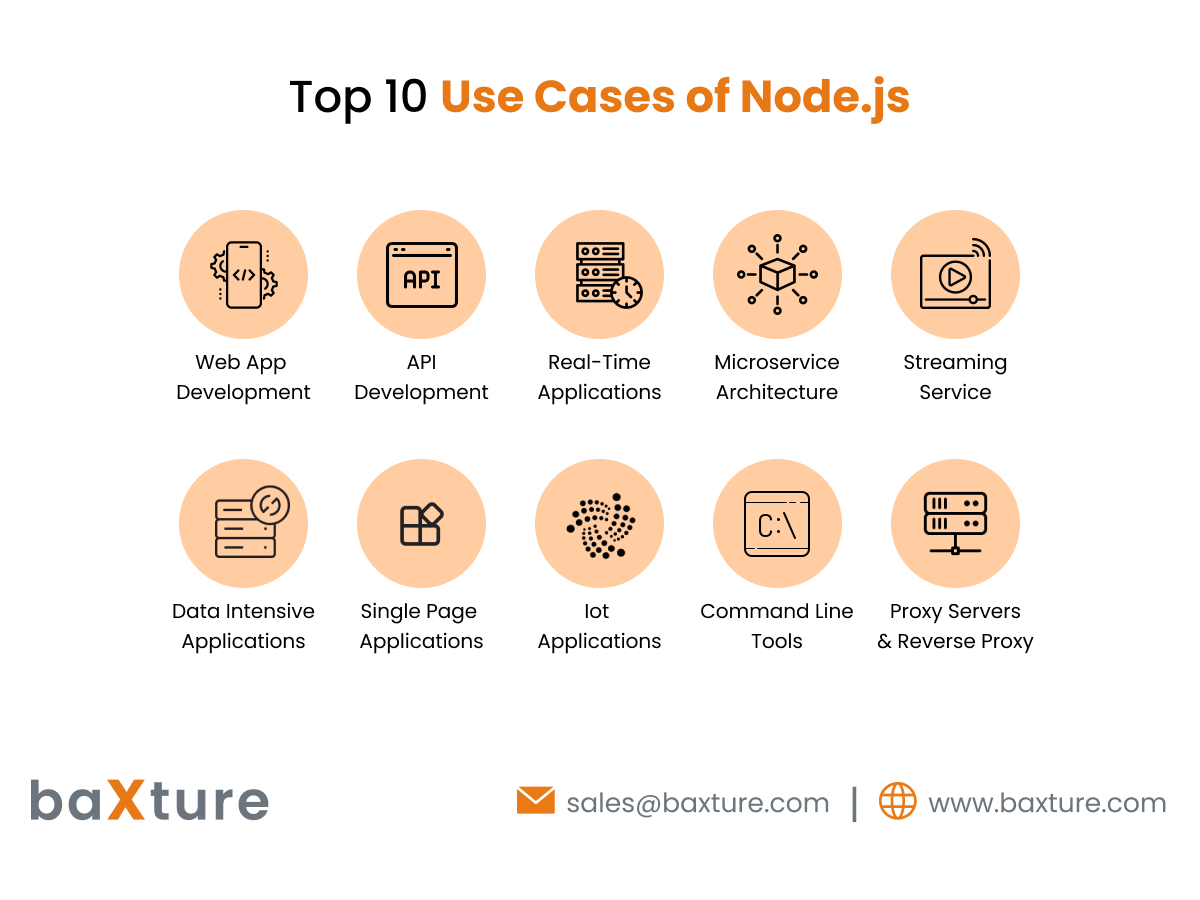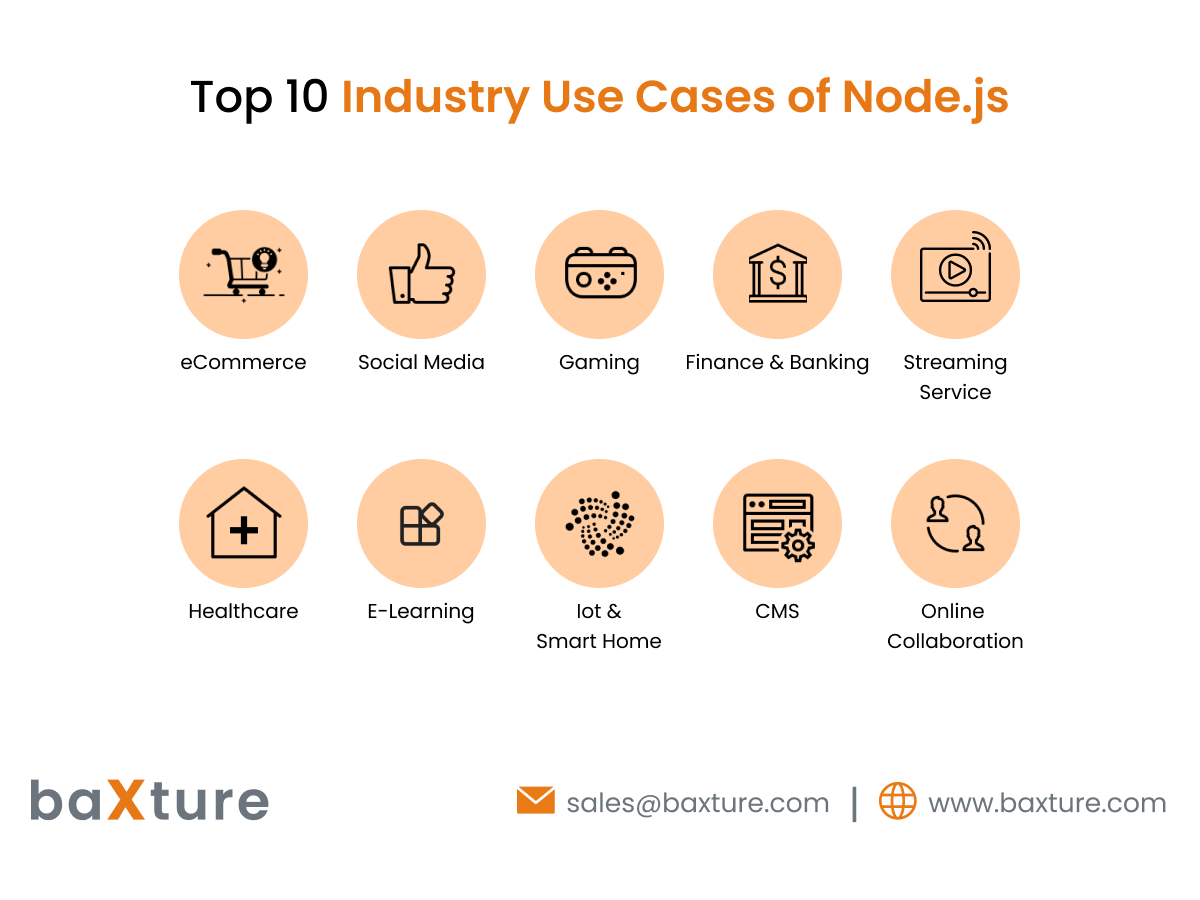Blogs
10 Use Cases of Node.js Technology

Beginning your next projects in Node.js can be tough since you are new and do not know the specifics of it. Though it can be a bit challenging at times but having a bit of an introduction of what it can do or the use cases can help you figure things out easily.
This is true for all the programming languages but since we are focusing on Node.js we will go that route and explain to you how it can help you transform your overall projects for good.
Through, this blog we will explain to you how Node.js works, the frameworks that are in line with Node.js and how it is different, Node.js use cases, and how different industries and product engineering can use it for success.
But, What is Node.js?
Node.js is a server-side runtime environment based on JavaScript, offering non-blocking I/O capabilities and event-driven programming. It enables developers to use JavaScript for both front-end and back-end development, streamlining the workflow and promoting code sharing.
Node.js is freely available for download, open-source, and supports various platforms. It has gained widespread popularity due to its performance advantages and developer-friendly nature. While specific real-time data may vary, 1.4% - 2.2% percentage of websites use Node.js.
Online applications benefit from its efficiency, making it ideal for real-time interactions, such as chat apps, gaming platforms, and streaming services.
Its concurrent connection handling and support for asynchronous programming make Node.js a compelling choice for responsive and scalable web applications.
If you are still not convinced. Here's a graph of the usage and Market Position of Node.js -

How is Node.js different from other available frameworks?
Unlike JavaScript in the browser, Node.js allows full-stack JavaScript development, promoting code reusability.
Its event-driven, non-blocking I/O model ensures high performance and speed, enhancing productivity in building scalable applications.
Organizations benefit from its ability to create high-performance, scalable, and real-time applications, leading to cost savings. However, CPU-intensive tasks must be carefully managed to avoid blocking the event loop.
Top 10 Use Cases of Node.js

Web Application Development:
Node.js is commonly used to build server-side web applications. Its asynchronous and non-blocking nature makes it suitable for handling real-time interactions, such as chat applications, social media platforms, and collaborative tools.
Developers can create responsive and scalable web apps, ensuring a smooth user experience.
API Development:
Node.js is well-suited for building APIs (Application Programming Interfaces) to communicate between different components of an application or to provide data to client-side applications.
Its lightweight and efficient nature makes it an excellent choice for developing RESTful APIs that can handle a large number of concurrent requests.
Real-time Applications:
Node.js excels in building real-time applications that require instant data updates and interactions. Examples include live chat applications, online gaming platforms, and collaborative tools that enable multiple users to work simultaneously on shared documents.
Microservices Architecture:
Node.js is commonly used in a microservices architecture, where different services of an application are divided into smaller, independent modules. Its scalability, performance, and ease of development make it an ideal choice for building microservices-based applications.
Streaming Services:
Node.js provides built-in support for handling streams, making it an excellent choice for building streaming services like video and audio streaming platforms, file uploading, and data processing.
Data-intensive Applications:
Node.js can efficiently handle data-intensive applications, such as real-time analytics, data dashboards, and data processing pipelines, due to its non-blocking I/O model.
Single Page Applications (SPAs):
Node.js is often used as a server for Single Page Applications, where the server serves the initial HTML page and then the client-side JavaScript handles subsequent interactions and updates.
Node.js can be combined with front-end frameworks like React, Angular, or Vue.js to build SPAs.
Internet of Things (IoT) Applications:
Node.js is lightweight and suitable for IoT applications, where devices need to send and receive data in real-time. Its event-driven architecture and small footprint make it well-suited for IoT devices and gateways.
Command Line Tools:
Node.js can be used to build command-line tools and utilities, allowing developers to automate tasks, perform system operations, and build development tools.
Proxy Servers and Reverse Proxies:
Node.js can be utilized to build proxy servers and reverse proxies, which are used to forward requests and responses between clients and servers, enhancing security and performance.
Top 10 Industry Use Cases of Node.js

Node.js can be beneficial for a wide range of industries due to its versatility and ability to handle real-time interactions, scalable applications, and data-intensive tasks. Here are some industries that can thrive by leveraging Node.js:
E-commerce:
The e-commerce industry can utilize Node.js to build responsive and real-time online shopping platforms. It enables features like real-time inventory updates, instant notifications, and chat support, providing a seamless shopping experience for customers.
Social Media:
Node.js can power social media platforms, where real-time interactions are crucial. It allows for instant messaging, notifications, and updates, fostering user engagement and enhancing the overall user experience.
Gaming:
The gaming industry can benefit from Node.js for building real-time multiplayer gaming platforms and gaming communities. It supports concurrent connections and enables efficient handling of gaming data and events.
Streaming Services:
Node.js is well-suited for media and entertainment industries that require streaming services for video, audio, and live broadcasts. Its streaming capabilities ensure smooth content delivery to users.
Finance and Banking:
Node.js can enhance financial applications by providing real-time data updates, secure communication, and responsive user interfaces for online banking, stock trading, and financial analytics.
Healthcare:
In the healthcare industry, Node.js can support real-time communication between doctors and patients, facilitate medical record management, and power telemedicine platforms.
Education and E-Learning:
Node.js can be used to develop real-time collaboration tools for virtual classrooms, e-learning platforms, and online tutoring services.
Travel and Hospitality:
For travel and hospitality businesses, Node.js can enable real-time booking systems, dynamic pricing, and responsive customer support, enhancing the overall user experience.
IoT and Smart Home:
Node.js is well-suited for the Internet of Things (IoT) industry, powering smart home applications and devices that require real-time data processing and communication.
Content Management Systems (CMS):
Node.js can be used to develop content management systems, enabling efficient content delivery and real-time updates for news websites, blogs, and content-driven platforms.
Online Collaboration Tools:
Industries that rely on collaborative tools, project management platforms, and team communication apps can benefit from Node.js' real-time capabilities and scalability.
Advertising and Marketing:
Node.js can be used to build real-time advertising platforms, personalized content delivery, and interactive marketing campaigns.
Challenges in Node.js
While Node.js offers numerous advantages for building fast and scalable web applications, it also comes with its fair share of challenges. Some of the key challenges in Node.js development include:
Callback Hell:
Due to the asynchronous nature of Node.js, developers often face "callback hell," a situation where deeply nested callbacks can make code hard to read and maintain. This can lead to code complexity and reduce the overall code quality.
Error Handling:
Proper error handling in Node.js can be challenging, as errors in asynchronous operations may not be caught in the traditional try-catch blocks. This can result in unhandled exceptions that can crash the application.
Scalability:
While Node.js is known for its ability to handle high concurrency, it may face scalability challenges when it comes to handling CPU-intensive tasks. A single-threaded event loop can become a bottleneck for CPU-bound operations.
Modules and Libraries:
Although Node.js has a vast ecosystem of modules and libraries, the quality and maintenance of some third-party packages may vary. Developers need to carefully select and manage dependencies to ensure the stability and security of their applications.
Security Concerns:
As with any server-side technology, Node.js applications can be susceptible to security vulnerabilities, such as injection attacks, cross-site scripting (XSS), and denial-of-service (DoS) attacks. Proper security measures and best practices are essential to mitigate these risks.
Community and Support:
While Node.js has a large and active community, it may not be as mature as some other programming languages and platforms. As a result, finding robust community support and resources for certain niche or emerging technologies can be challenging.
Package Versioning and Updates:
Managing package versioning and updates in Node.js projects can be complex, especially when dealing with multiple dependencies. Ensuring that all packages are up-to-date and compatible can be time-consuming.
Learning Curve:
Node.js is based on JavaScript, and developers with a background in synchronous programming languages may find it challenging to adapt to the asynchronous and event-driven programming paradigm.
Monitoring and Debugging:
Debugging and monitoring Node.js applications can be more complicated than traditional synchronous applications due to their event-driven nature. Proper tools and practices are necessary to identify and resolve issues effectively.
Cold Start Performance:
Node.js applications may experience a slight delay in performance during the initial startup (cold start) compared to traditional server-side technologies. This may impact certain use cases that require instantaneous response times.
Despite these challenges, Node.js remains a powerful and popular choice for building
Alternative to Node.js
There are several alternatives to Node.js for server-side development, each with its own strengths and use cases. Some of the notable alternatives include:
Deno:
Created by the same person who built Node.js (Ryan Dahl), Deno is a modern and secure runtime for JavaScript and TypeScript. It addresses some of the shortcomings of Node.js, such as improved security with a more restrictive approach to file system and network access.
Python (with frameworks like Django and Flask):
Python is a popular server-side programming language with a robust ecosystem of web frameworks. Django and Flask are two widely used frameworks for building web applications, APIs, and dynamic websites.
Ruby (with Ruby on Rails):
Ruby on Rails is a mature and powerful web framework that follows the convention-over-configuration paradigm. It emphasizes simplicity and productivity, making it an attractive choice for rapid application development.
Java (with frameworks like Spring and Jakarta EE):
Java is a versatile and widely adopted language for server-side development. Frameworks like Spring and Jakarta EE provide extensive features and support for building scalable enterprise-level applications.
PHP (with frameworks like Laravel and Symfony):
PHP has been a long-standing choice for web development, and frameworks like Laravel and Symfony offer modern features and tools for building robust web applications.
Go (Golang):
Go is a statically typed language known for its performance and concurrency support. It is a strong contender for building high-performance server-side applications, especially for systems with high concurrency needs.
ASP.NET (with C#):
ASP.NET is a framework for building web applications on the Microsoft .NET platform, and C# is the primary language used with it. It provides a comprehensive ecosystem for building web applications, APIs, and services.
Elixir (with Phoenix):
Elixir is a functional programming language built on the Erlang virtual machine, known for its fault-tolerant and highly concurrent nature. Phoenix is a web framework for Elixir, designed for building real-time applications and APIs.
Scala (with frameworks like Play Framework and Akka):
Scala is a modern programming language that runs on the Java Virtual Machine (JVM). Play Framework and Akka are two popular frameworks in the Scala ecosystem for building web applications and concurrent systems.
Rust:
Rust is a systems programming language known for its memory safety and performance. While not as commonly used for web development, it is gaining popularity for building efficient and secure server-side applications.
Final Thoughts
In conclusion, Node.js is a powerful and versatile technology that has revolutionized server-side development with its event-driven, non-blocking I/O model. It enables seamless full-stack JavaScript development, fosters real-time interactions, and supports scalable applications. While it has challenges like callback hell and security concerns, its vast ecosystem and active community provide valuable resources. Alternatives like Deno, Python, Ruby on Rails, and others offer compelling options for specific use cases. Ultimately, the choice of technology depends on project requirements, team expertise, and performance needs. Embracing Node.js or its alternatives can empower developers to create innovative and efficient web applications for diverse industries.